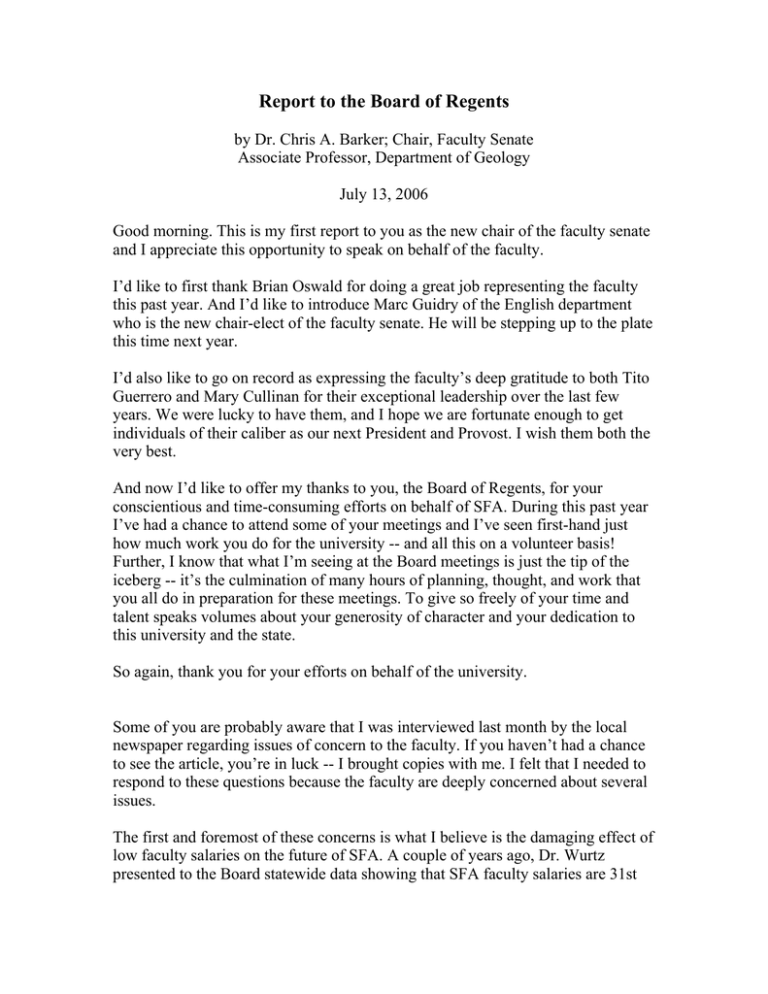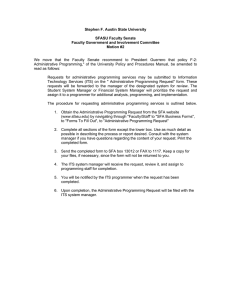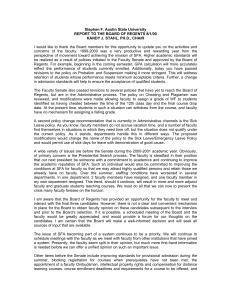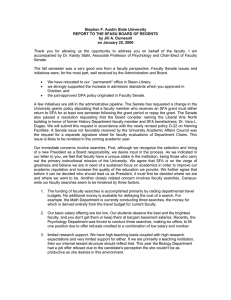Report to the Board of Regents
advertisement

Report to the Board of Regents by Dr. Chris A. Barker; Chair, Faculty Senate Associate Professor, Department of Geology July 13, 2006 Good morning. This is my first report to you as the new chair of the faculty senate and I appreciate this opportunity to speak on behalf of the faculty. I’d like to first thank Brian Oswald for doing a great job representing the faculty this past year. And I’d like to introduce Marc Guidry of the English department who is the new chair-elect of the faculty senate. He will be stepping up to the plate this time next year. I’d also like to go on record as expressing the faculty’s deep gratitude to both Tito Guerrero and Mary Cullinan for their exceptional leadership over the last few years. We were lucky to have them, and I hope we are fortunate enough to get individuals of their caliber as our next President and Provost. I wish them both the very best. And now I’d like to offer my thanks to you, the Board of Regents, for your conscientious and time-consuming efforts on behalf of SFA. During this past year I’ve had a chance to attend some of your meetings and I’ve seen first-hand just how much work you do for the university -- and all this on a volunteer basis! Further, I know that what I’m seeing at the Board meetings is just the tip of the iceberg -- it’s the culmination of many hours of planning, thought, and work that you all do in preparation for these meetings. To give so freely of your time and talent speaks volumes about your generosity of character and your dedication to this university and the state. So again, thank you for your efforts on behalf of the university. Some of you are probably aware that I was interviewed last month by the local newspaper regarding issues of concern to the faculty. If you haven’t had a chance to see the article, you’re in luck -- I brought copies with me. I felt that I needed to respond to these questions because the faculty are deeply concerned about several issues. The first and foremost of these concerns is what I believe is the damaging effect of low faculty salaries on the future of SFA. A couple of years ago, Dr. Wurtz presented to the Board statewide data showing that SFA faculty salaries are 31st out of 35 public universities in Texas. This is in spite of the fact that we are the 15th largest university. Thus, many smaller schools are paying their faculty better. I’m sure you realize that these low salaries are demoralizing for the hard-working, talented faculty who have dedicated their careers to SFA. However, what is galvanizing the faculty to action is that our salaries are now so low that they are making it very difficult to recruit and retain talented new teachers. Many departments across campus are experiencing the “three year shuffle,” in which newly hired faculty stay two to three years and then jump ship for a significant pay raise at another school. The faculty at SFA are asking: if we can’t keep good new hires, what kind of future will the university have? If we continue to pay second-rate salaries, we’re going to end up with a second-rate faculty -- and that would destroy the reputation of this university. Based on my conversations with faculty, and based on the survey that was done this past Spring, I think the university is at a cross-roads. Many of the faculty are so frustrated that they want SFA to join a system. They want to go the Lamar University route. As I’m sure you know, at Lamar the faculty voted to join a system, and in short order, that’s what happened. What effect did it have? Faculty salaries went up substantially. Of course, there is no guarantee that would happen here if we joined a system, but it’s my duty to tell you, conditions at SFA are driving many faculty members to contemplate the Lamar model. The faculty understand that there is not an endless supply of money for the university. But they are asking: why can’t SFA pay as well as our peer institutions? What’s wrong here? The 1% pay raise announced a few months ago only heightened the frustration felt by faculty. Especially given that this small raise came just a few months after announcements that millions of dollars were going to be spent on additional sports programs and facilities. I suspect that for some faculty -- and probably some administrators -- that is what pushed them to favor joining a system. My impression is that if certain problems are not addressed, more and more faculty are going to be in favor of joining a system. That’s why I think the university is at a cross-roads. But of course, there is another alternative to the Lamar University model. As another article in the newspaper pointed out, there is also the model of TWU, Texas Woman’s University in Denton, an independent school which has experienced 43% growth since 2000 and is about to open an additional campus in Houston. The president of that university said that fixing their problems involved raising faculty salaries, among other actions. She expressly urged us at SFA to find a way to internally fix our problems rather than lose our independence, which she clearly cherishes at her school. In fact, she generously offered to help SFA work through whatever problems might exist between faculty and the Board. One of the things I’ve always valued about SFA is its independence, and I urge the Board to work with the faculty senate in delineating issues of concern to the faculty and then addressing those issues. I would be delighted to help in that process. One simple thing that would be mutually beneficial would be to improve communication between faculty and the Board. If I can generalize from my own experience, most faculty are probably only vaguely aware of what the Board does at SFA. Conversely, the Board has a largely untapped resource in the faculty. Faculty members have had years of experience with the day-to-day operations of the university. We are the people on the factory floor, so to speak, who see what works and doesn’t work. The collective experience of the faculty can be a great asset to the Board in its information-gathering and decision-making process -- if communications are improved. To improve communication, you might consider hosting an annual “Open Forum with the Board”; an afternoon set aside to meet with faculty where each side could discuss their ideas about how to improve things at SFA. You might have one or more Faculty & Board “Evening Socials” every year -informal gatherings to chat with each other. Something as simple as a suggestion box for input on a regular basis from the faculty could improve communication. Countless successful organizations have utilized the suggestion box. You might get some comments that are not usable, but others could be pure gold. I would suggest both an electronic and a physical suggestion box. However, to really facilitate communication between the Board and the faculty, I have a more weighty proposal, one that I feel would go furtherest in bridging the gap between the faculty and the Board. I suggest that you add faculty representation to the Board; specifically, that you add one or two faculty regents to the Board and that, ideally, they be voting members, not just token appointments. I suggest that the candidates for the faculty regent positions be put forth by the faculty senate and that the appointment be for at least 3 years for the sake of continuity. I will be glad to work with the Board in developing this or any of the proposals in this report. I know things get messy when you seek input from a large group of people, but I think the university would benefit greatly if there were more dialog between the Board and the faculty. ------------------------------I’d like to congratulate Baker Patillo on becoming President of the university. I look forward to working with you during the coming year. ------------------------------Turning to other issues, I want to thank the University’s Computer Replacement Committee for having an open forum this week to seek input from the faculty on the proposed policy. We appreciate their willingness to have this dialog and I feel sure that the final policy will benefit greatly as a result of this forum. The faculty are concerned about this policy because our computers are such an integral part of our creative process. Several serious concerns with the policy were raised by faculty members. Next, I’d like to let you know that the faculty senate has taken the following actions in response to requests from faculty: • A committee has been established to draw up an action plan for bringing faculty salaries up to equity with our peer institutions. This was prompted by the realization that it might be more useful to the Board if we presented a plan for improving salaries, instead of a simple request for such an increase. The committee is composed of several past faculty senate chairs, and other faculty. • In response to the survey that was done this past Spring, and to requests from faculty, a committee has been convened to study the various higher educational systems in Texas to determine the characteristics of each and to make a recommendation regarding which system might be a best fit for SFA should it be deemed in the best interests of the university to pursue that option. That concludes my report to the Board. I look forward to the pleasure of working with you during the coming year. I’d be glad to answer any questions you might have.




